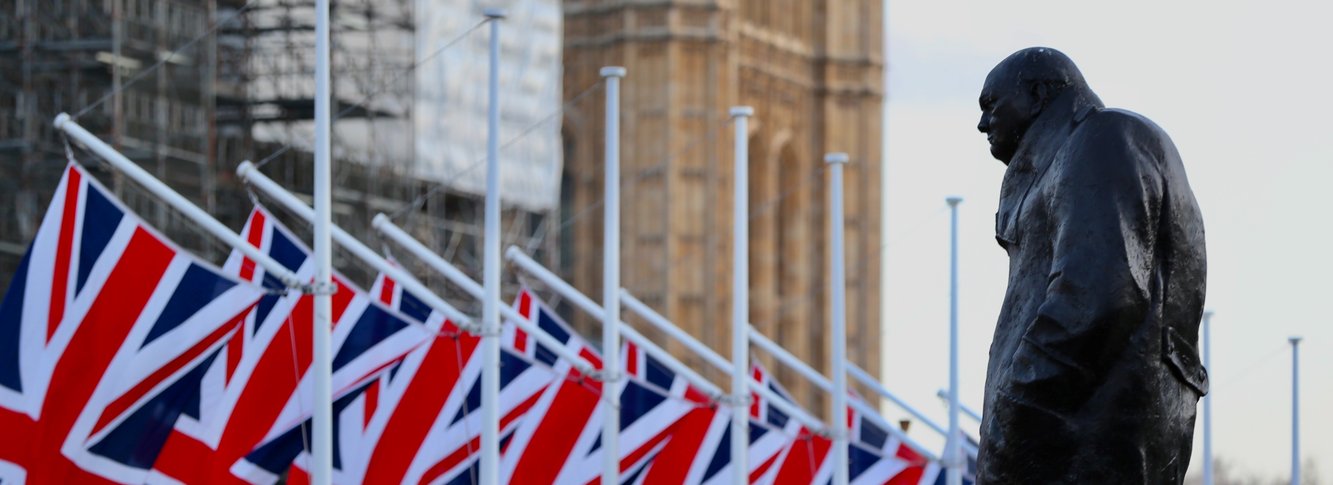| 6 mins read
In June 2022, Extinction Rebellion supporters threw red paint over a bust of Winston Churchill – found by a 2002 survey to be regarded as the greatest ever Briton. In 2021 Churchill College appointed a Working Group on Churchill, Race and Empire which was supposed to re-examine Churchill’s legacy. Then they got cold feet.
It is true that taking down a statue, or daubing it with paint, does little to dismantle the Churchill myth. However, far more effective than throwing paint at Churchill is Tariq Ali’s book, which seeks not so much to flush Churchill down the toilet of history, but to reassign him to his rightful place as one of history’s most over-rated figures. Ali’s book certainly belongs to the anti-Churchill camp: the subtitle—His Times, His Crimes—leaves no doubt that this is a demolition job.
Churchill’s Legacy: The Myth Begins
It was the Second World War and how it was seen by British eyes that saved Churchill’s reputation. But, after the 1951 election, he turned out to be quite unmemorable Prime Minister. His main achievements were the bloody suppression of the Mau-Mau rebellion and securing Truman’s support for a coup against Iran’s then Prime Minister, Mohammad Mossadegh (appointed by a regularly elected parliament), for nationalising British assets.
The Churchill cult developed mainly after his death in 1965 and, according to Tariq Ali, escalated during and after the Falklands War when, for a little while, Britain ruled a few waves around some distant islands. Had Churchill died in 1939, he would be remembered, if at all, as one of the least successful Tory politicians of the twentieth century.
The Pre-Prime Minister Years
In 1895 Churchill, now a journalist, was in Cuba to cover the Spanish-Cuban war, siding with Spanish colonialists and describing the island as ‘calm’, unaware that it was plagued by disease and famine. He then moved to the Sudan where he celebrated British victory against the outnumbered natives. Afterwards, he went to South Africa to cover the Boer War. His accounts do not mention the concentration camps, but there is plenty about himself.
Entering politics as a Liberal, he was quickly promoted to Home Secretary (1910-11) and was a supporter of social welfare legislation but did not hesitate to repress striking miners. He is cursed in Wales for his repression of miners in Tonypandy. Women’s suffrage, he declared, ‘is contrary to natural law and the practice of civilized states…’ Those who seek to defend him, when confronted with his numerous regressive remarks, say ‘Ah, but he was a man of his time’. This is true, but there were people, in Churchill’s time, who denounced warmongering, supported the suffragettes, and opposed colonialism. Churchill was not one of them.
Churchill did not last long as Home Secretary. He subsequently held a series of minor Cabinet posts. His major war initiative, the Battle of Gallipoli, ended in famous humiliating defeat. After WW1, he became Secretary of State for War. That was his post during the Irish War of Independence (1919–21), where he despatched the notorious ‘Black and Tans’ torture squad, in a desperate attempt to defeat the Irish rebellion. He then wanted to intervene in the Russian civil war, determined to defeat Bolshevism. Supporting an armed intervention in Russia showed that Churchill did not understand what was going on in Russia, except that the Bolsheviks were bad. In 1924, he became Chancellor of the Exchequer, returning Britain to the Gold Standard in 1925, a decision John Maynard Keynes labelled ‘silly’. Churchill was out of power until 1940 when he was brought into the coalition government as Prime Minister thanks to the Labour Party.
Ali’s Interpretation
The problem with Tariq Ali’s otherwise highly readable book is that he takes the subtitle, ‘his times’, too literally. When discussing Churchill and Ireland, instead of contextualising Churchill and his contemporaries’ positions on the Irish conflict, he starts a twenty-page discussion on Irish revisionist historiography with little connection to Churchill. Churchill’s failed intervention in Russia turns into an opportunity for Ali to devote plenty of historical details on Russian history from 1905 onwards. These regular departures into history and away from Churchill are often interesting, but their relevance is questionable.
Sometimes, Ali is too severe: when the Japanese invaded China in 1937, Churchill looked the other way. In the 1,065 pages of Churchill’s Memoirs of the Second World War (1959), the Japanese 1937 massacre in Nanjing, one of the worst crimes of the Second World War, is barely mentioned. But, as Ali acknowledges, most WW2 historians omit it too. Eurocentrism dictates that the Second World War started in 1939 when Hitler invaded Poland.
Tariq Ali has done a good job at having another go at the national idol, but I fear the myth is far from dispelled.
Winston Churchill. His Times, His Crimes, by Tariq Ali. Verso. 432 pp. £25
Need help using Wiley? Click here for help using Wiley


